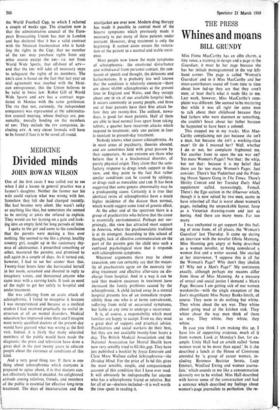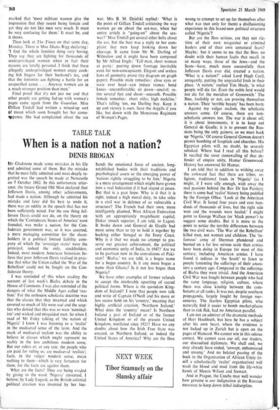Whines and moans
THE PRESS
BILL GRUNDY
Miss Fiona MacCarthy has an elfin charm, _a tiny voice, a training in design and a page in the Guardian; it must be her page because she has her initials monogrammed in the top left- hand corner. The page is called 'Woman's Guardian' and in it Miss MacCarthy and her sister-contributors sound off from time to time about how fed-up they are that they aren't men; at least that's what it reads like to me. Last week, however, Miss MacCarthy's com- plaint was different. She seemed to be muttering that while it was all right for some men to talk about their childhood because they had fathers who were dustmen or something, she couldn't boast about her father because he happened to have been a colonel.
This stopped me in my tracks. Miss Mac- Carthy complaining not just because she isn't a man, but because she isn't a working-elass man! Or do I misread her? Well, whether I do or not, her complaint frightened me. Yet another front to open the sex war on? Yet more Women's Pages? Not that: the whip, but not that: because it is 'my belief that there are far too many Women's Pages. Just consider. There's Sue Puddefoot and the Print- ing House Square Gang in The Times. There's Shirley Conran and her Tuesday Daily Mail supplement called, nauseatingly, Femail. There's the Ego section in the Observer which, though it is now edited by two men, seems to have inherited all that is worst about women's pages, including the unspeakable layout, fussy as a Victorian drawing-room and just as boring. And there are many more. Far too many.
1 was enchanted to get support for this feel- ing of mine from, of all places, the 'Woman's Guardian' last Thursday.. It came up during an interview with the novelist Olivia Manning. Miss Manning gets angry at being described as a woman novelist, at being considered a woman first and a writer second. She snarled at her interviewer, 'I suppose this is all for the Woman's Page? Why don't they 'abolish it? Why not a Men's Page?' My sentiments exactly, although perhaps my reasons differ from those of Miss Manning. As a measure of sexual and social justice I demand a -Man's Page. Because I am getting sick of our women wordsmiths—with the single exception of the Sun's magnificent Miss Nancy Banks-Smith, of course. They seem to do nothing but whine.
They whine about the sex war. They whine about going mad at the kitchen sink. They whine about the way men think of them as sexy. They whine, they whine, they whine.
In case you think I am making this up, I have lots of supporting evidence, much of it
from women. Look at Monday's Sun, for ex- ample. Unity Hall had an article called 'Some women want to be more than equal.' In it she described a lunch at the House of Commons attended by 'a group of career women, in- cluding Baroness Beatrice Scrota, Lady Emmett, Winifred Ewing and women journa- lists,' which sounds to me like a consummation devoutly nor to be wished. Miss Hall described with horror some of the conversation and had a sentence which described my feelings about women's-page journalists to perfection. She re- marked that 'most militant women give the impression that they resent being female and yet they do not like men very much. It must be very confusing for them.' It must be, and it shows.
Then look at The Times on that same day, Monday. There is Miss Diana Rigg declaring: .'I find the whole feminist thing very boring. They say they are fighting for thousands of underprivileged women when in fact their reasons are totally personal. I think that these allegedly underprivileged women enjoy cook- ing fish fingers for their husband's tea, and that the feminists are fighting a battle for an unspecified cause . . . Anyway women are in a much stronger position than men.'
Final proof that it's not just me and that other people are getting fed-up with women's pages came again from the Guardian. Miss Gillian Tindall had written a mixed-up sort of moan which soon brought her her come- vippance. She had complained about the sex war. Mrs B. M. Dzielski replied: 'What is the point of Gillian Tindall criticising the way women go on about the sex-war, when her entire article is "going-on" about the sex- war?' Miss Tindall got several other belts about the ear, but the best was a reply to her com- plaint that men keep looking down her cleavage. It came from Mr W. Darling of Wilmslow and it might have been composed by Mr Alfred Jingle: 'Tall man, short woman at party : peering down frontage inevitable even for non-concupiscent. Elegant and sexless laws of geometry prove (try diagram on graph paper). Possible male remedies: close eyes or stare over head—can induce trance; bend knees—uncomfortable; sit down—uncivil; re- tire several feet and shout—uncouth. Possible female remedies: short stilts; high neckline.' That's telling 'em, me Darling boy. Keep it up and victory is ours. Save the Argylls if you like, but down with the Monstrous Regiment of Women's Pages.











































 Previous page
Previous page